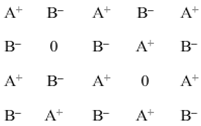 Short Answer Type
Short Answer TypeWhich of the following is a more stable complex and why?
(i) [Co(NH3)6]3+
(ii) [Co(en)3]3+
An element with density 11.2 g cm-3 forms a f.c.c. lattice with edge length of 4 x10-8
Calculate the atomic mass of the element. (Given: NA = 6.022x 10-23 (mol-1)
Examine the given defective crystal:

Answer the following questions:
(i) What type of stoichiometric defect is shown by the crystal?
(ii) How is the density of the crystal affected by this defect?
(iii) What type of ionic substances shows such defect?
Calculate the mass of compound (molar mass = 256 g mol-1) to be dissolved in 75 of benzene to lower its freezing point by 0.48 K (Kf= 5.12 kg mol-1 )
Outline the principles behind the refining of metals by the following methods:
Zone refining method
Outline the principles behind the refining of metals by the following methods:
Chromatographic method
Chromatography method:
Chromatography is the technique used for separation of the components of a mixture that are soluble in the same solvent and are differently adsorbed on an adsorbent. This technique was first used for separation of colours and hence, the name. There are two phases in chromatography - the stationary phase and the mobile phase. The components of the mixture are absorbed differently in the stationary phase, thus leading to their separation. There are many different types of chromatography - paper chromatography, thin-layer chromatography, gas chromatography etc.
